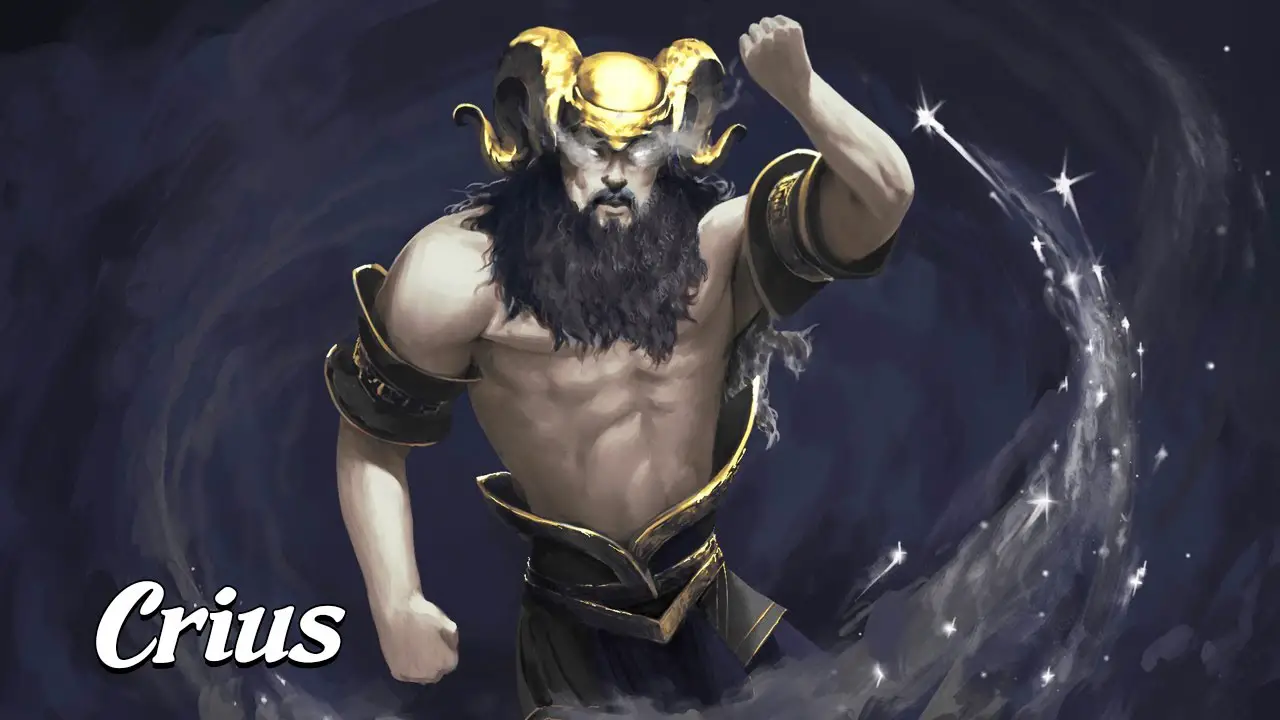
Crius was one of the Titans, a group of primordial deities who ruled the world before the Olympian gods. He was associated with the power of mastery, and his name in Greek means “the strong one” or “the mighty one.”
Details about Crius’ Family and Children
Crius was born to Uranus and Gaia, along with his eleven siblings, the Titans.
Crius was married to his sister Eurybia, and together they had three children: Astraeus, Pallas, and Perses. Astraeus was the god of the stars and the father of the four winds, Pallas was a Titan who personified warcraft and Perses was the Titan god of destruction.
10 Myths and Facts About Crius in Greek Mythology
- Myth: Crius was one of the most powerful Titans. Fact: This is not entirely true. While Crius was a powerful and important figure in Greek mythology, he was not as well-known as some of the other Titans, such as Cronus and Hyperion.
- Myth: Crius was the god of time. Fact: This is not entirely true. While Crius was associated with the passage of time, he was not specifically the god of time. This role was held primarily by the god Cronus.
- Myth: Crius was the god of constellations. Fact: This is not true. While Crius was associated with different aspects, such as the power of mastery, he was not specifically associated with the constellations in Greek mythology. The Titan god who was primarily associated with the constellations was Atlas.
- Myth: Crius was married to his sister Theia. Fact: This is not entirely true. Crius was actually married to his sister Eurybia.
- Myth: Crius was the father of all gods. Fact: This is not entirely true. While Crius was the father of three powerful gods, he was not the father of all gods.
- Myth: Crius was associated with the earth. Fact: This is not entirely true. While Crius was associated with the natural world, he was not specifically associated with the earth.
- Myth: Crius was a god of the sky. Fact: This is not entirely true. While Crius was associated with the heavens, he was not specifically a god of the sky.
- Myth: Crius was immortal. Fact: This is not entirely true. While Crius was a Titan, a powerful god-like figure, he was not immortal. He was eventually defeated by the Olympian gods, who took control of the universe.
- Myth: Crius’ children were all associated with war. Fact: This is not entirely true. While one of Crius’ children, Pallas, was associated with warcraft, his other children were associated with different domains and attributes.
- Myth: Crius played a major role in Greek mythology. Fact: This is not entirely true. While Crius was an important figure in Greek mythology, he did not play a major role in the stories of the gods.
Symbolism of Crius in Greek Mythology
Crius represented the idea of steadfastness and perseverance, as well as the ability to maintain a sense of balance in the face of change and upheaval.
Crius was also associated with the idea of time. His role as a Titan and his association with the natural world reflected the importance of the passage of time and the cyclical nature of life. This connection symbolized the relationship between the heavens and the earth, and the need for balance between these two realms.
Another symbol of Crius in Greek mythology is his association with strategic thinking and decision-making. According to some interpretations of the myth, Crius was considered to be a wise and intelligent deity who could see the big picture and make sound judgments. He was often depicted as a leader or advisor to the other Titans, and his strategic mind was considered to be one of his most important attributes.
Another symbol of Crius in Greek mythology is his association with the Ram. While Crius was not specifically associated with the zodiac sign Aries, he was sometimes known as “the Ram” or “the Starry One” in ancient Greek literature. The Ram was seen as a symbol of strength, power, and leadership, which are all qualities that were associated with Crius in his role as a Titan.
Finally, Crius is sometimes associated with the concept of balance and harmony in the natural world. As a Titan, he was seen as a powerful and unchanging figure who helped to maintain the order of the cosmos. Some modern interpretations of Crius and the Titans emphasize their role in preserving a natural balance between the different elements of the universe, which could include the balance between life and death, light and darkness, or good and evil.